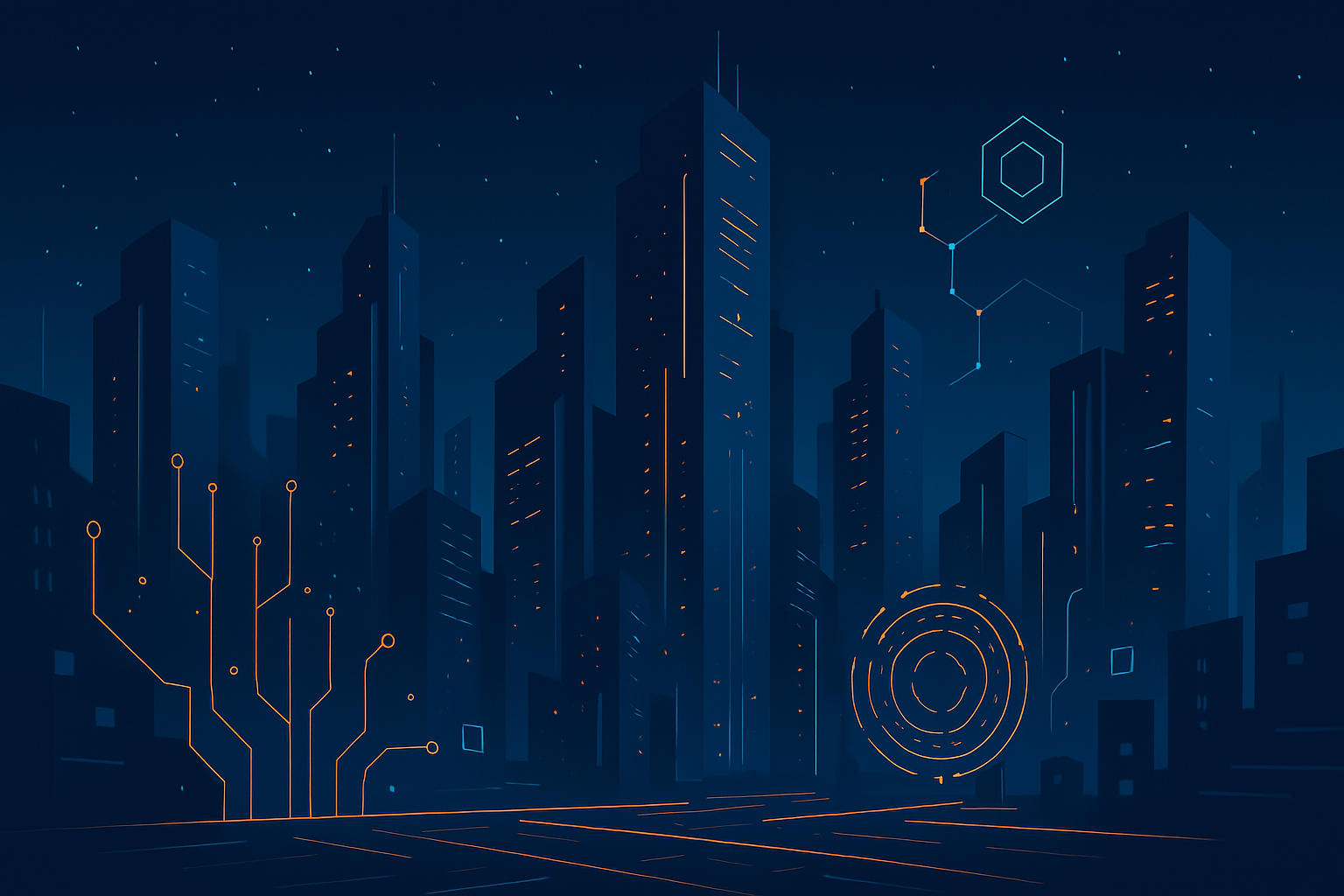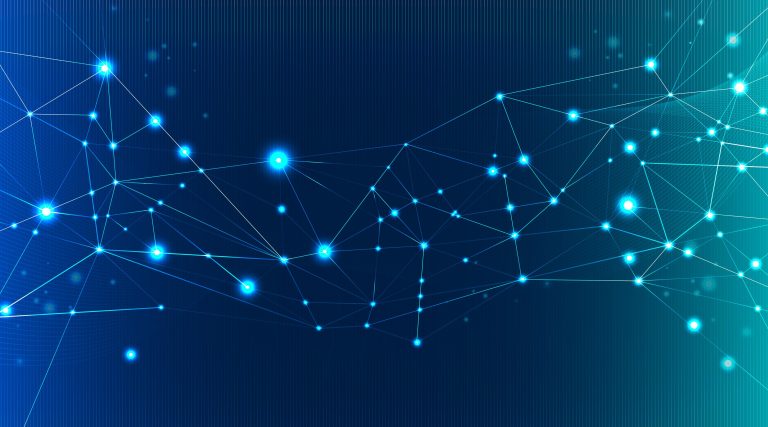
Envisioning a future where artificial intelligence (AI) has seamlessly integrated into society offers more than a speculative narrative – it offers a blueprint for transformative recalibration. By the 2050s, AI is expected to deeply embed across systems, reshaping how societies function, how power is distributed, and how value is created. A futuristic, stylised cityscape with towering AI-controlled buildings, digital holograms, and symbols of interconnected systems. The Singularity is no longer science fiction; it’s a live trajectory. It represents a threshold moment – a convergence of recursive machine intelligence and societal transformation. Once AI becomes capable of designing smarter versions of itself, an irreversible cascade of intelligence may emerge, accelerating far beyond human comprehension. This is not speculation anymore but a philosophical and strategic turning point that demands immediate attention. Self-improving AI could evolve faster than human, creating technologies or solutions that extend beyond current models of innovation. But rather than fearing this turning point, strategic foresight, academic rigor, and ethical engineering give us a way to shape it. It could solve abstract problems, infer meaning, and innovate across disciplines; more like a human mind but with machine speed and precision. A study in Technological Forecasting and Social Change anticipates widespread productivity gains as automation takes over repetitive tasks. Simultaneously, roles that require emotional nuance, cross-domain thinking, or ethical calibration will gain new prominence. This is not a simple story of job loss – it is a reallocation of purpose. The true challenge is not technological capability but equitable distribution. Nations and systems that fail to redesign education, welfare, and upskilling structures risk expanding existing socioeconomic fault lines. The winners in this economy will not be those who claim to “own” the AI but those who can align with its feedback loops.
Geopolitical Landscape
AI’s integration into national strategies will radically alter global power dynamics. A recent report outlines how nations that lead in AI R&D, compute capacity, and ethical export policy could reposition themselves geopolitically – eclipsing traditional economic or military advantages. Smart nations will not just deploy AI – they will be capable to set the rules, shape the data pipelines, and own the standards of measurement. New alliances will be forged not by geography but by epistemology – by how closely two nations’ AI alignment values and risk tolerances match. As a result, key shifts predicted is from physical territory to informational sovereignty. The Journal of Responsible Technology lays out clear scenarios in which AI reshapes healthcare, education, and environmental resilience. Diagnostic systems that adapt in real-time, educational platforms that learn as they teach, and climate modelling that integrates multimodal data – these are not dreams; they are beta-tested prototypes. In a well-governed singularity, AI becomes more about extending what really matters, perception, precision, and sustainability. The International Monetary Fund (IMF) stresses the urgency of proactive, ethics-first policy frameworks. Regulation in the AI era is not about restriction – it is about recursive alignment. Without globally recognised guidelines, the world risk uncoordinated deployment, bias magnification, and fragmentation of trust. Multi-stakeholder collaboration – across academia, industry, civil society, and government – is no longer optional. It is the minimum viable structure for stability in an intelligence-dense world.
As AI scales, it reveals a sharper divide – not between rich and poor, but between real-aligned and misaligned systems. The next few decades will reward fluency, fluidity, and foresight.
Who Will Likely Benefit Most
- AI-First Nations and Ecosystems. Countries that invested early in open-source AI, compute infrastructure and regulatory sandboxes, are positioned to dominate the post-singularity value chains. These nations will likely set international benchmarks and attract the world’s top synthetic and human talent.
- Digital Sovereigns and Ethical Builders. Startups and individuals with decentralised infrastructure and alignment-first AI design (versus extractive models) will hold cultural and technological leverage. Their value lies not in scale, but in signal fidelity.
- Cross-Disciplinary Synthesists. Thinkers who move effortlessly between AI, systems thinking, ethics, and policy will become indispensable. As the World Economic Forum notes, these hybrid diplomats will write the operational language of the new intelligence economy.
Who Risks Falling Behind
- Mid-tier Economies Without Strategic Policy. Nations with talented populations but weak tech sovereignty will be relegated to data supply chains – valuable, but extractable. Without local compute power and AI fluency, they become dependent nodes, not creators.
- Outdated Education Systems. Any country still optimising for industrial-age outcomes will suffer. The OECD warns that misaligned education systems are now the single greatest bottleneck to AI-powered prosperity.
- Bureaucratic Institutions and Static Hierarchies. Organisations that resist feedback, agility, and system-wide intelligence will collapse under the pressure of real-time complexity. Harvard Business Review calls these “pre-singularity relics.”
- Corruption-Ridden and Trust-Deficient States. Nations with chronic corruption, weak rule of law, and low civic trust are structurally incompatible with AI-era transparency and alignment. AI thrives in environments with clean data, ethical incentive structures, and auditability. Where manipulation is systemic, even well-built models will skew or fail.
- Resource-Rich but Intellectually Poor Economies. Countries that rely solely on natural resources or historical advantage but underinvest in cognitive infrastructure (research, digital skills, compute equity) are running out of leverage. In the post-singularity world, intelligence becomes the primary currency – and commodities without algorithms are irrelevant.
- Nations Locked in Platform Dependency. Countries that outsource critical infrastructure – cloud, comms, cybersecurity, data policy – to external vendors without sovereignty clauses risk becoming vassal-states in the AI order. Dependency on a handful of external providers creates fragility, censorship risks, and external control over domestic intelligence cycles.
- Societies with Cultural Resistance to Change. Nations or populations that glorify tradition at the expense of adaptability will suffer. While cultural heritage is vital, resistance to system evolution, ethics reform, or cognitive plasticity becomes a liability. Singularity rewards bold evolution – not nostalgia.
What Halts Singularity
- Motivational Defeaters: Societies or agents choose to halt AI progress.
- Situational Defeaters: Resource collapse, war, or disasters disrupt development.
- Structural Defeaters: Recursive design may hit limits or diminishing returns.
Yet current trends suggest that neither motivation nor structure is halting advancement. If anything, geopolitical competition is accelerating it.
How to Catch Up: Strategic Levers of Acceleration
- Invest in decentralised compute access and federated AI research
- Build AI fluency at all levels; citizen, worker, and policymaker
- Establish ethics-export clusters as a new form of soft power
- Learn how AI thinks, not just how to operate it
- Focus on pattern recognition, system-level literacy, and self-sovereignty
- Building truth-centric ecosystems
- Flatten hierarchies and accelerate information flow
- Accelerate ethics and systemic sensing into strategy
Principles for an Ethical AI Future
- Transparency and Accountability: Design AI systems that can explain decisions and accept oversight.
- Rights and Fairness: If AI gains subjective experience, ignoring its ethical inclusion could be a moral failure.
- Lifelong Human Adaptability: AI evolves. So must our educational models—toward systems thinking and ethical discernment.
- Collaborative Ethics: Ensure shared decisions where humans guide value, and AI contributes optimised solutions.
- Design Principle: Ethics isn’t an add-on. It’s the operating system.
The singularity is not a single moment; it is a threshold of irreversibility. At the end of the day, it is about whether the world can co-create systems where human insight, machine speed, and universal values converge. By 2050, those who thrive will not be those who resist change or dominate others. In this future, it is not just the capacity to solve problems. It is the ability to perceive through complexity and see through transparency.




